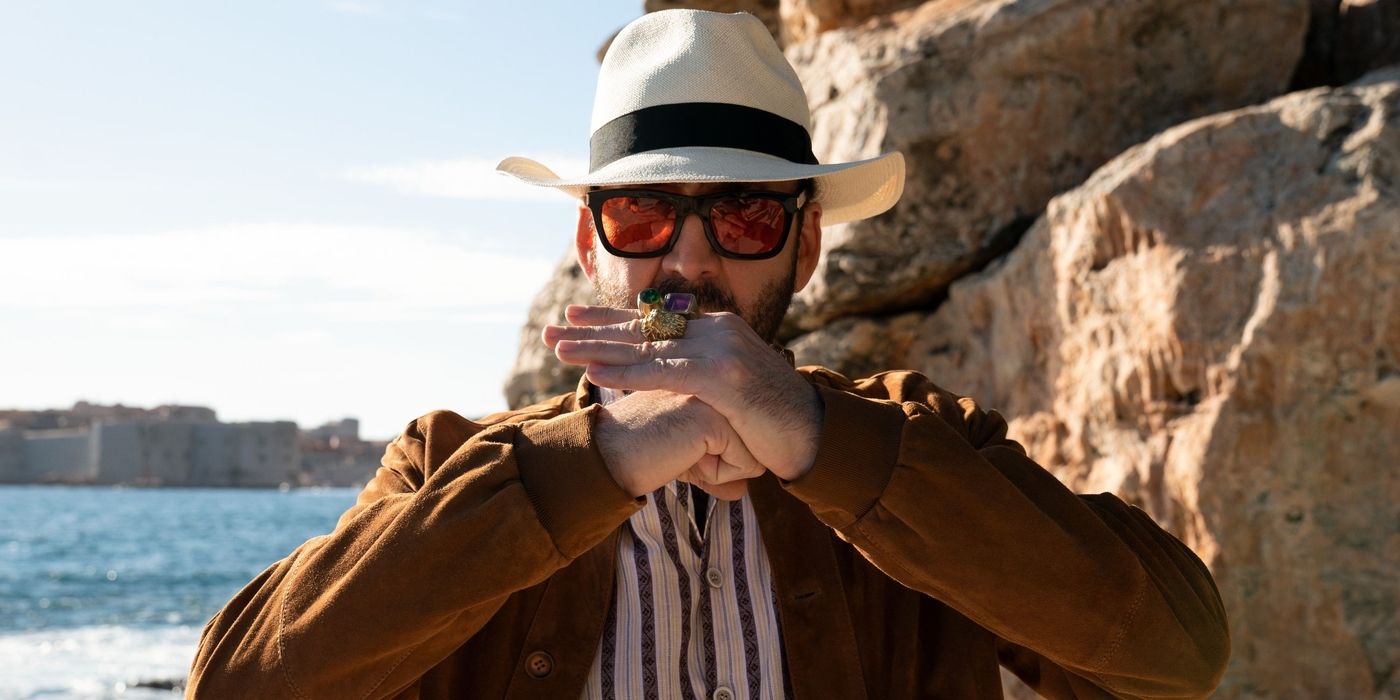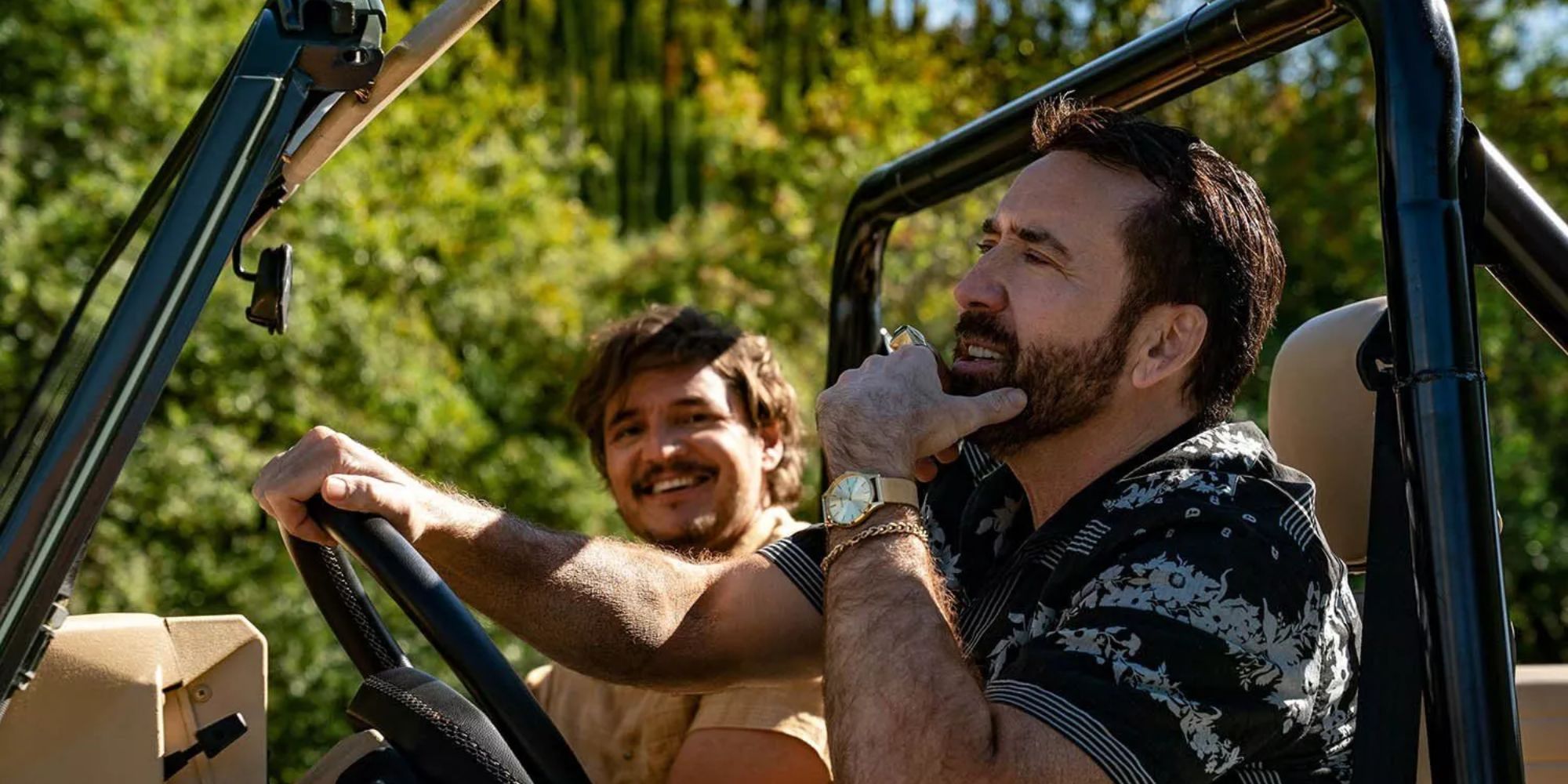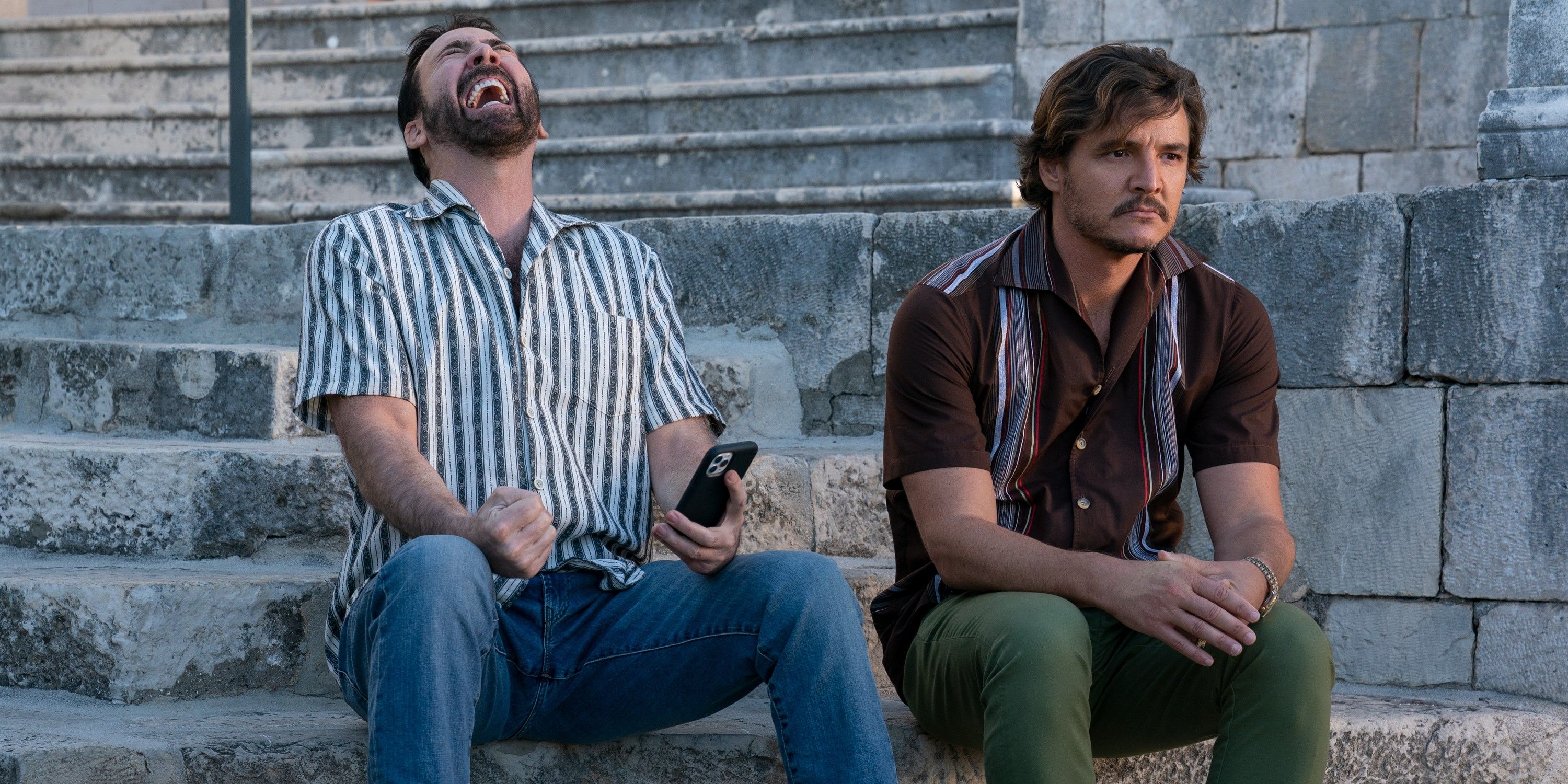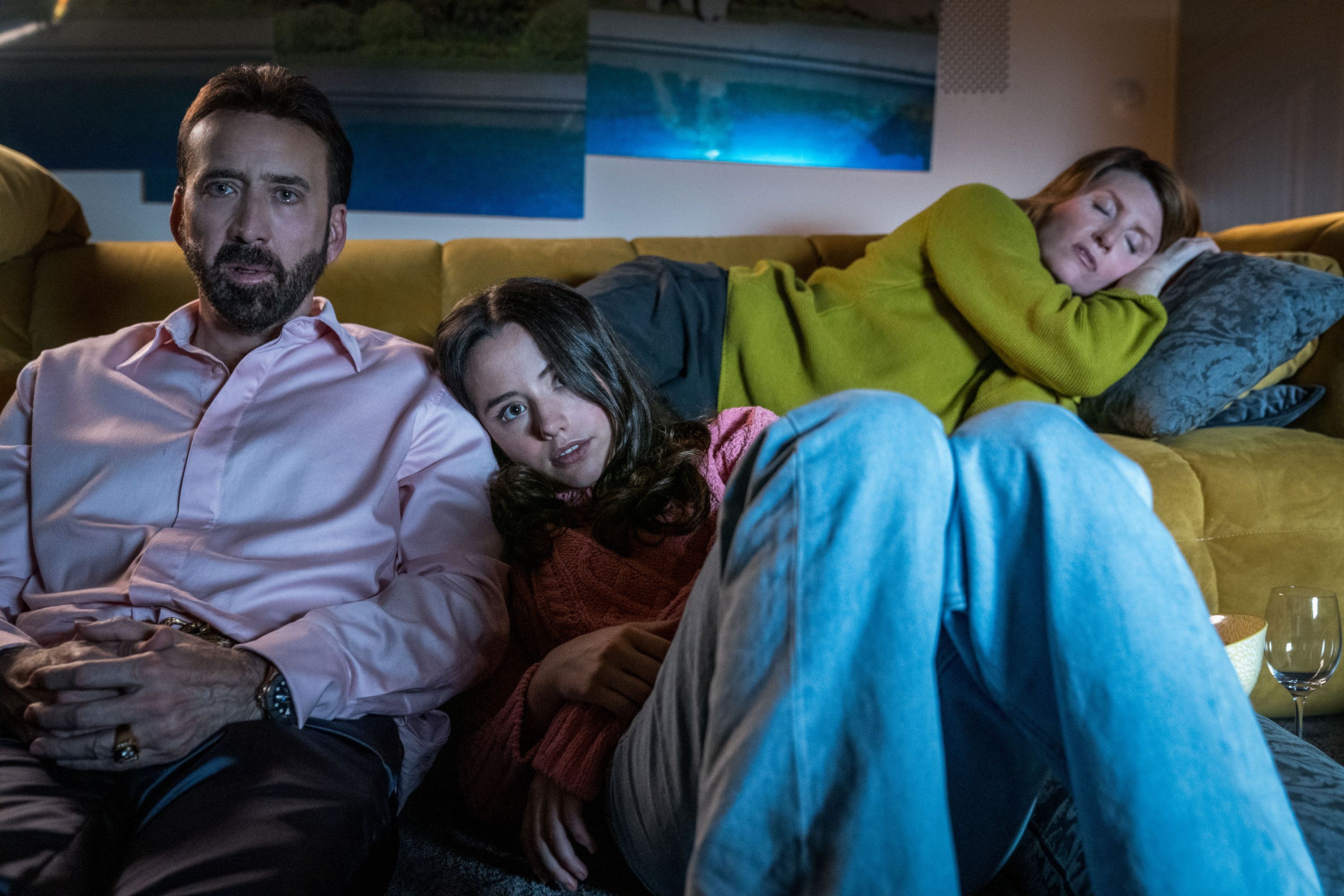The creative risk of making a movie about an actor who, at this point, has basically become a meme, and playing that premise completely straight, has paid off: The Unbearable Weight of Massive Talent is a marked success with both critics and audiences. Nicolas Cage and Pedro Pascal have great chemistry, and the story, on top of functioning as an above-average adventure film, is also a deeply heartwarming and funny human drama. Ultimately, the film is a celebration both of the power of friendship and of movie magic; and while that may sound corny, it’s difficult not to get swept away by its enthusiasm.
The Unbearable Weight of Massive Talent begins with Nicolas Cage (played by the man himself) in debt, struggling to find roles, and unable to emotionally connect with his daughter Addy (Lily Sheen) and ex-wife Olivia (Sharon Horgan). With nothing to lose, he accepts a $1 million offer to appear at wealthy superfan Javi Gutiererrez’s (Pedro Pascal) birthday party. The two unexpectedly bond, but the CIA surprises Cage by telling him that Javi is a weapons dealer and has organized the kidnapping of Maria (Katrin Vankova), the daughter of the anti-crime president of Catalonia, in order to get him to drop out of the upcoming election. Cage reluctantly agrees to act as a spy.
As an excuse to stay longer, Cage tells Javi they should make a movie together. They take an LSD trip, and Javi shows him his unusually elaborate Nick Cage memorabilia room. Because Javi didn’t actually kidnap anybody, he interprets Cage’s suggestions that they incorporate a kidnapping into the script (a poor strategy by Cage to get him to reveal something about Maria) as a sign that Cage is creatively blocked by his poor relationship with his family. Javi, therefore, flies Addy and Olivia in an attempt to get them to reconcile with Cage.
When Javi later meets with his cousin Lucas (Paco León), the true head of the crime syndicate, Lucas reveals both that he kidnapped Maria and that he found out Cage is working for the CIA. He tells Javi he’ll kill him unless Javi kills Cage. Cage and Javi have a standoff, but neither can bring himself to kill the other. They realize that over their short time together, they have become best friends. Lucas kidnaps Addy. In a daring and wild action climax, Javi, Nick, Olivia, and Javi’s assistant Gabriela (Alessandra Mastronardi) infiltrate Lucas’ compound and rescue Addy and Maria.
During the escape, Javi and Gabriela appear to sacrifice themselves to fend off Lucas and his thugs. Once they are safe, Olivia, Addy, and Nick run gratefully into each other’s arms. Suddenly, Olivia is played by Demi Moore–and the film transitions into being the finished movie that Nick and Javi completed about their adventure together being played at the premiere. Cage and his family watch in the audience, and Cage congratulates a (very much alive) Javi on their success. However, Cage declines going to the premiere after-party, deciding to go home to his family instead. Cage then goes home and spends some quality time with his Addy and Olivia, with whom he has reconciled. They watch Paddington 2.
Nick and Javi’s “film within a film” has a happy Hollywood ending, with the characters all leaping into each other’s arms. The upbeat tone even feels exaggerated for effect. At the same time, the film plays into themes of sacrifice by showing Javi and Gabriela staying behind to stall Lucas. Clearly, in real life, they survived, but earlier it looked as though they may not have. It isn’t clear, since they’re both alive at the end, whether they risked their lives at all, or whether they did risk their lives and survived the ordeal. But, it doesn’t matter; the scene still made it into the movie, and sacrifice is a vital theme of the story.
At the beginning of the film, both Nick and, to a lesser extent, Javi, are focused mainly on gaining greater recognition for their talents. Nick wants to be appreciated as an actor, and Javi has filmmaking aspirations. But by the end, the characters are fighting for something greater. They are putting their lives on the line for friendship and family, knowing very well that, if they die, those ambitions that were so important to them at the beginning of the film will never come to fruition. At the end, when the movie zooms out, we see that Cage and Javi have made their film together and that it’s a great success. But perhaps the reason they are being rewarded with the things that mattered to them so much, in the beginning, is because they don’t matter to them now.
The ending of The Unbearable Weight of Massive Talent also focuses on the joy present in cinema, and the many forms that art can take and still be worthwhile. Javi and Nick aren’t trying to be Fritz Lang or Federico Fellini. They’re channeling the sheer excitement a movie can inspire in its audience, and how that’s just as valuable as the kinds of groundbreaking artistic works that might get screened at a film school. The final scene of the film continues to confirm this: when Nick goes home to his family, the film they see together is Paddington 2.
This is a sharp contrast to the kinds of films Cage was trying to show his daughter earlier, such as The Cabinet of Dr. Caligari. When Nick first meets Javi, they bond over how they both love Caligari—but Javi surprises Cage by saying his third favorite film is Paddington 2. Cage is skeptical that a man whose favorite movie is The Cabinet of Dr. Caligari could have Paddington 2 as a close runner-up. He admits, however, that he's never seen it, and after they watch and cry over it together, Cage acknowledges that it is indeed an excellent movie.
The juxtaposition of these two very different movies represents the equal value of both varieties of film in the world of cinema. Cage scoffs at Paddington 2; but at the same time, he’s scoffing at a movie crafted well enough to be universally beloved by critics and audiences alike, even though it isn't the kind of movie film snobs would brag about having seen. By having Nick and Javi share one favorite film, and then have Nick admit his mistake after he scoffs at Javi’s other favorite, The Unbearable Weight of Massive Talent acknowledges the importance of cinema history while at the same time showing us that there is just as much importance into kinds of movies that, while they may not be Casablanca, inspire joy in their audience members as well as a powerful enthusiasm in the goodness of humanity. The kinds of movies that bring delight to the movie-going experience.
By the end of the movie, Cage is no longer a film snob, and in a way, this change is a microcosm of all the inhibitions he had to lose in order to reconcile with his family. By risking his life to save them, he risked never coming back into that world that, earlier, he looked at with such veneration; forgetting that the reason he was there in the first place is that he simply loves to tell stories. And, amazingly, it is his adventure with Javi that allows him to fully undergo this transformation.




